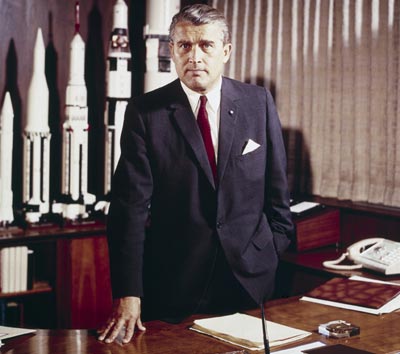|
|
 The origins of the Space Age, which includes polarizing people like Wernher von Braun, provides considerable fodder for space historians and other researchers. (credit: NASA) |
The humanities and space history
by Taylor Dinerman
Monday, October 29, 2007
Anyone who doubts that French Imperialism and its mission civilizatrice is not alive and well, and exercising dominance over America’s campuses, should have attended the “Remembering the Space Age” conference, held at the American Association for the Advancement of Science in Washington DC on October 22–23. Resounding phrases and expressions from the world of postmodern theory (which, for some reason, they no longer want to call “postmodern”) filled the air. Narrative tropes and semiotic signifiers kept bumping into one another, in all their glorious complexity.
This theoretical approach can sometimes present a few interesting, if minor insights. Amy Nelson’s talk, “Lost in Space - Global Echoes of Sputnik 2” raised the question of how the story of Laika “continues to inform multivariant echoes in global popular culture,” from a Finnish surf rock band to comic books and animal rights activist musicians in the UK. She carefully tiptoed around the fact that it was the side of “real existing socialism” that sent the dog to its doom.
A few presenters bravely tried to stick up for progressive enlightenment values, notably Dwayne Day and Roger Lanius, but even Launius succumbed in the end to the powerful gravitational pull of postmodern jargon. John Krige gave a conventional and rational, but highly debatable, analysis of ESA’s origins and history. The claim that the European Space Agency was somehow born with a uniquely “civilian” orientation has often been made but deserves the kind of critical look that academics usually reserve for US institutions.
Another academic who avoided the post-modern trap was Michael Neufeld whose biography of Wernher Von Braun has just been published. He laid out in calm and balanced tones the way the history of the V-2 rocket’s development has been romanticized and distorted by the propaganda needs of both sides during the Cold War.
| Exposing any weaknesses in the logic and arguments of space advocates is excellent preparation for what they will face from politicians. |
The greatest and most interesting thing about this conference was its ambiguous relationship to the US government. Andrew Butrica gave a long and passionate denunciation of almost everything that the US government, dominated as it has been by the GOP for much of the last quarter century, has done. In fact, few attendees had anything positive to say about NASA or the US space program, which has, in spite of its many and all too evident flaws, accomplished some remarkable things.
This brings up the question of what role, if any, the humanities should play in future decisions about the space program. Should any group which is fundamentally hostile to the basic goals of a project, whose ambitions are closely identified with America’s national interests, have any influence on it? The answer should be of course: just as the critiques of the anti-war movement have helped America’s military leaders to improve their performance, so the critics of the space program serve a valuable function. Exposing any weaknesses in the logic and arguments of space advocates is excellent preparation for what they will face from politicians.
Much of the criticism is based on either a heartfelt dislike of the program and of the so-called military industrial complex, or on the urge to deconstruct any structure that supports bourgeois civilization and stands in the way of the triumph of the “other”. Since space travel is one of the great symbolic achievements of Western civilization, and its origins are morally suspect, embedded as they are in the two great totalitarian socialist regimes of the 20th century, it is only natural that some will seek to tear down the ultimate triumph of American Exceptionalism.
In any case they have generously provided space advocates with what may be the best justification for the continued exploration and colonization of space: “Who want to be stuck on the same planet with the semioticians, forever?”
Taylor Dinerman is an author and journalist based in New York City.
|
|
